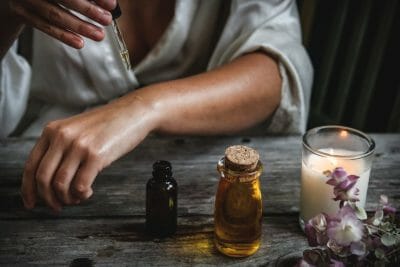Essential oils can add wonderful scents to homemade soaps and candles, or freshen a room when put in a diffuser. However, essential oils have other, more practical uses.
Citronella
Fun fact about Citronella, despite the similar name there is no relation at all to citrus trees. The plant is actually a variety of grass rather than a fruit tree and its leaves are an integral ingredient in several Asian dishes.
Essential oil enthusiasts overwhelmingly prefer Citronella as a natural bug repellent against mosquitoes and other outdoor pests. By mixing a couple of drops with water in a spray bottle, you can apply it to your clothes as you would any other bug spray. As oil and water separate, make sure you shake the mix thoroughly before every use.
Another option is to put it in a diffuser or buy a patio candle infused with it. Your house or porch will smell refreshing to you, but insects will find it unbearable. However, proponents of Citronella suggest using it only in enclosed areas to maintain a higher concentration of it in the air.
Eucalyptus
The most well-known use of Eucalyptus essential oil is as a decongestant. Adding one or two drops to a room humidifier can help bring some relief when you have a chest cold or plugged nose. If you don’t want to bother roommates or family members with the scent, you can also make your own vapor rub by mixing a couple of drops with a carrier oil or a small tub of petroleum jelly.
If you don’t use up all of your homemade mixture before you get over your congestion, don’t worry. You can set it aside and save it, as another possible use for it is rubbing it on aching muscles. The cooling sensation can offer mild relief after a vigorous gym workout or a hard day of yard work. You could also break it out as a massage oil for an intimate date night with a partner or spouse.
According to a recent article on everyday uses for essential oils, many people have found relief from arthritis pain with the help of natural remedies, and you can learn more about the top essential oils for arthritis pain at revive-eo.com.
Lavender
The most popular use of this essential oil is aroma therapy. However, you can use any oil that gives you a sense of calm and peace for this purpose.
Aroma therapy can involve performing a relaxing activity such as meditation, prayer, or even a shower or bath. Before this activity, you can add a couple of drops of oil to a cotton ball, or a diffuser, or just open the bottle and keep it near. Creating a mental association between the feeling of relaxation brought on by this activity and the scent itself turns it into a sort of Pavlovian trigger that makes it easier for you to unwind as soon as you detect that smell.
If lavender isn’t your preference, brands like Young Living Essential Oils offer aromatherapy kits to help set the mood. If your relaxing activity is bible study or prayer, you might want to try their Oils of Ancient Scripture kit. The Feelings kit offers blends inspired by intentions, such as forgiveness and valor.
Tea Tree
While further research is needed to confirm claims, Tea Tree is another essential oil that people use for multiple ailments. Fans swear by its effectiveness in treating acne. A mix of a couple of drops with aloe vera gel or carrier oil can be applied to the face as a leave-on mask to prevent breakouts. Be sure to keep it away from your eyes as it can sting.
Another potential use for this mixture is as a treatment for ringworm, athlete’s foot, or bug bites. It can be cooling on the skin which reduces itching and swelling. It may also provide mild antimicrobial qualities. While Tea Tree oil should never be ingested, a drop directly on a bug bite may help with the discomfort.
The last fan-favorite use of Tea Tree oil is as relief for dandruff. Adding a few drops to a mild, unscented shampoo can create a cooling treatment that offers relief from constant itching and scratching.
Things to Remember
A rule of thumb for essential oil enthusiasts is “natural doesn’t mean harmless” as some oils can cause allergic reactions or be irritating to skin, mucus membranes, or lungs. You may want to consult with your doctor before using essential oils, especially if you are pregnant or are receiving treatment for health conditions. As with doctor-prescribed medications, you should follow the suggested guidelines before applying specific essential oils, and always perform a skin test before using.
